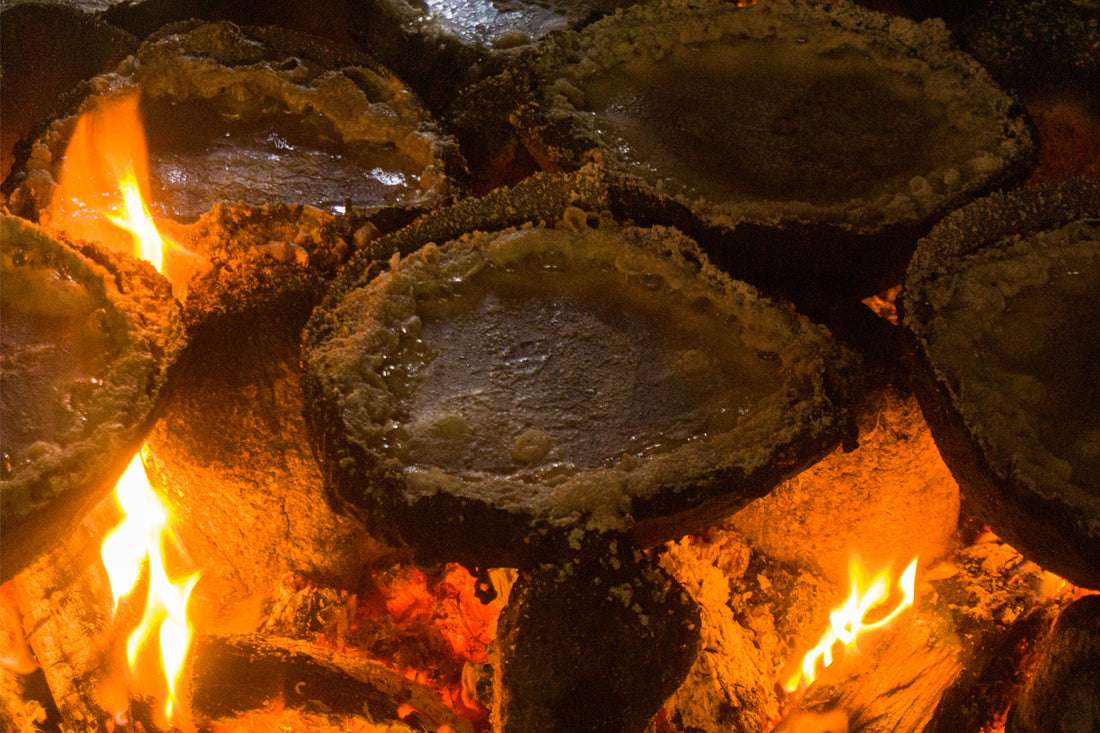Salz war ein sehr wichtiger Rohstoff im Reich der alten Maya. Salz spielte eine wichtige Rolle in der Ernährung und für den Handel, so konnte etwa Fisch und Fleisch konserviert und hunderte Kilometer entfernt verkauft und verzehrt werden.
Damals wie heute wird ein besonderes Salz abgebaut, ein natürliches schwarzes Salz aus den Vulkanminen in den Hochländern Guatemalas.
Nur noch wenige Handwerker der lokalen Quiche Familien beherrschen die alten Methoden und das Wissen über die richtige Verarbeitung und nehmen den beschwerlichen Tagebau auf sich.
Damals, in antiken und vor-spanischen Zeiten ein notwendiges Grundnahrungsmittel, wird dieses spezielle schwarze Salz heute in der guatemaltekischen und internationalen Spitzengastronomie verwendet. Der hohe Gehalt an Eisen, Schwefel, Magnesium und Natrium in Kombination mit dem einzigartigen Geschmack bewirken einen Hochgenuss für den anspruchsvollen Gaumen.
Aufgrund der klimatischen Bedingungen und Umwelteinflüssen kann das schwarze Vulkansalz nur in zwei Monaten zwischen Februar und April gefördert werden.
Der Zugang wird den Großteil des Jahres verwährt, aufgrund der Temperaturen unter Tage und dem Umstand, dass sich die Minen regelmäßig mit Wasser füllen, was den Abbau praktisch unmöglich macht.
Der Salzabbau in den Minen Guatemalas und der Produktionsprozess haben sich in vielen Jahrhunderten kaum verändert; die Herstellung und Produktion des schwarzen Salzes wird von Zeremonien und Ritualen begleitet.
Dazu gehört das regelmäßige Reinigen der Produktionsstätten oder die Vorbereitung für den "Großen Tag", an dem das Salz in Tontöpfen gekocht und vollendet wird.
Zunächst werden die perfekten Steine aus den Flüssen gesucht und eine spezielle Holzart gesammelt, die besonders heißes Feuer erzeugt. Tontöpfe werden an mehreren Tagen ausgearbeitet - sie können nur einmal verwendet werden, bevor sie im Feuer verzehren.
Im ersten Schritt wird die Salzpfanne mit denselben Erden bedeckt, die seit Jahrhunderten verwendet werden. Die dann salzbehafteten Erden werden gefiltert und in der Kochhütte gelagert. Das Salz kommt in die Tontöpfe und wird auf den Fluss-Steinen platziert, um die Töpfe vom direkten Kontakt mit dem Feuerholz abzuhalten. Nun wird das schwarze Salz langsam in den Tontöpfen gekocht, immer unter den Augen der anwesenden Salzmacher.
Nach dem Kochvorgang werden die Tontöpfe aufgebrochen; das Salz haftet so stark an den Gefäßen, dass es sonst unmöglich getrennt werden kann. Die so entstehenden Salzblöcke werden im letzten Schritt von Hand mit Steinen zermahlen und sind in unterschiedlichen Mahlgraden von grob bis fein erhältlich.


